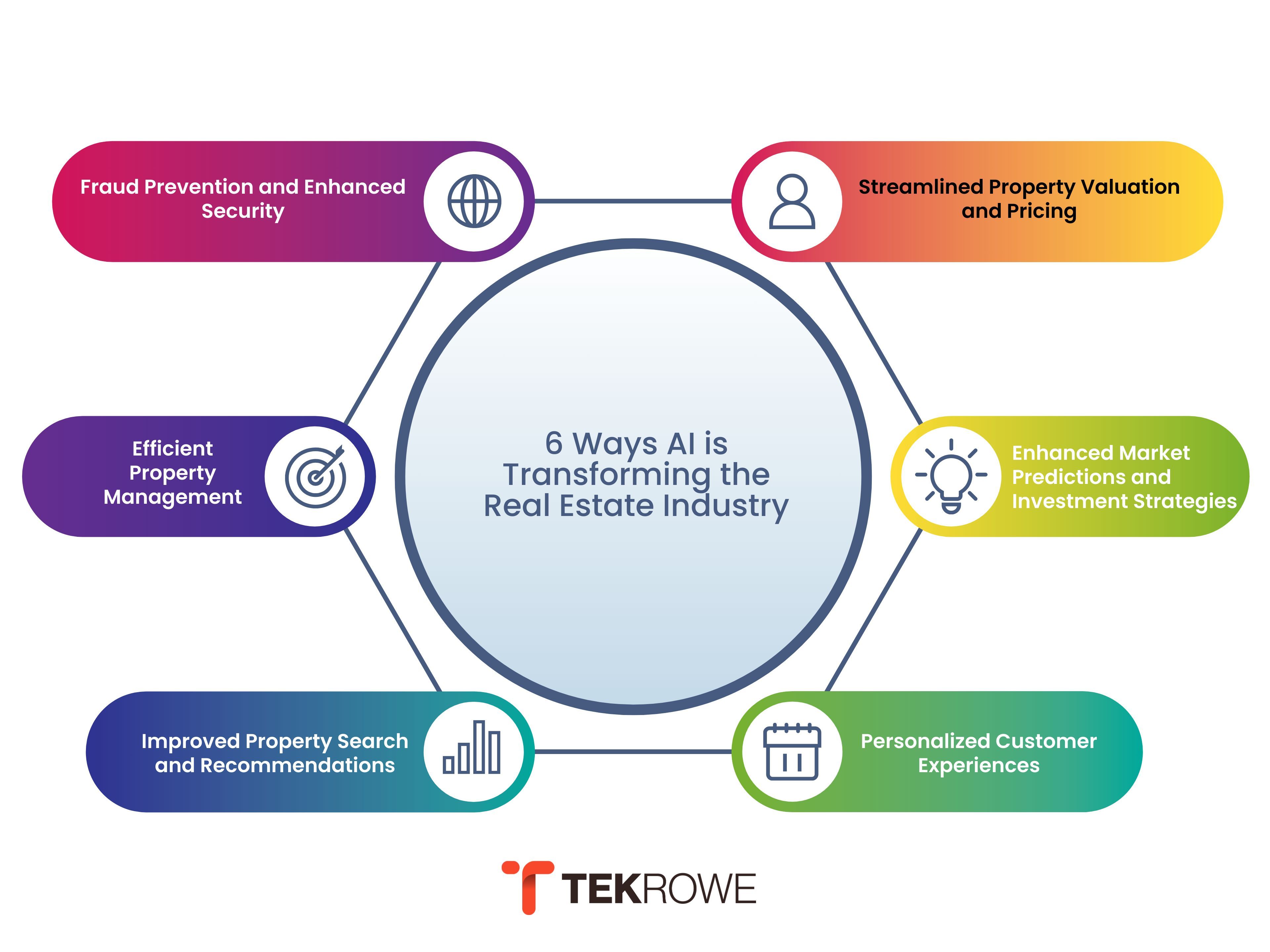The real estate industry is experiencing a remarkable transformation, fueled by advancements in artificial intelligence (AI). Traditionally dependent on manual tasks and human expertise, the sector is now leveraging AI in real estate to revolutionize various aspects of property management, sales, and market analysis. These AI technologies are introducing unprecedented levels of efficiency, accuracy, and innovation, fundamentally reshaping the way real estate operations are conducted.
The potential for AI in commercial real estate is immense, with estimates suggesting it could generate between $110 billion and $180 billion in added value. Even in its early stages, using AI in real estate is already proving its worth by enhancing property management processes, offering refined market analysis, improving customer experiences, and streamlining transactions. These developments not only improve operational efficiency but also create new avenues for value creation and competitive advantage.
For property owners, investors, and tenants, incorporating AI into real estate operations offers transformative benefits. AI-powered tools and systems are reshaping traditional practices, making them more streamlined and effective. By leveraging AI in real estate, the industry can unlock new levels of performance, innovation, and opportunity, paving the way for a smarter and more dynamic future. This blog delves into how AI is transforming the real estate sector, particularly in property management and sales.
Introduction to AI in Real Estate
Artificial intelligence (AI) refers to machines or software programs capable of mimicking human intelligence to perform tasks such as decision-making, problem-solving, and learning. In the real estate sector, AI is being applied to automate and optimize processes that once required significant human effort. Whether you're managing large commercial properties or trying to close sales in residential markets, AI offers solutions that improve efficiency and accuracy.
Real estate is a data-rich industry. From property listings to market analyses, there’s an abundance of data that AI can process in a fraction of the time it would take a human. AI algorithms use this data to provide better customer experiences, optimize operational tasks, and offer market insights that guide investment decisions.
The Role of AI in Commercial Real Estate
Artificial intelligence (AI) is playing a transformative role in commercial real estate (CRE), reshaping how properties are managed, transactions are executed, and investment decisions are made. As the sector becomes more data-driven, AI is emerging as a powerful tool that provides enhanced accuracy, efficiency, and innovative solutions to complex challenges in CRE. From market forecasting to tenant management, AI is making it possible to optimize operations in ways that were previously unimaginable. Here’s an in-depth exploration of how AI is revolutionizing commercial real estate:
1. Predictive Analytics and Market Forecasting
One of the most valuable applications of AI in commercial real estate is its ability to provide predictive analytics and market forecasting. AI algorithms can process vast amounts of historical data, including local market trends, property values, and broader economic factors, allowing professionals to make more informed decisions.
2. Property Valuation and Price Optimization
Accurate property valuation is critical in commercial real estate, and AI is enhancing this process by providing more precise and dynamic models.
3. Enhanced Property Management
AI is transforming the day-to-day operations of commercial property management, automating tasks that used to require significant manual effort and allowing property managers to focus on more strategic activities.
4. AI-Powered Tenant Experience and Leasing
AI is also transforming tenant relations and the leasing process, making it easier for property managers to deliver personalized service and streamline leasing administration.
5. AI for Investment and Risk Management
AI is invaluable for managing risks and identifying high-potential investment opportunities in commercial real estate. With AI, investors can gain deeper insights into market conditions and potential risks.
6. AI-Enhanced Customer and Tenant Service
AI-powered chatbots and virtual assistants are transforming the customer service landscape in commercial real estate by automating routine interactions and inquiries.
7. Streamlining Transactions with AI
The commercial real estate transaction process can be complex, involving lengthy due diligence, contract negotiations, and financial analysis. AI is helping to simplify and speed up these processes.
How Using AI in Real Estate Can Boost Sales
Artificial Intelligence (AI) is reshaping the way real estate sales are conducted, making the entire process faster, more efficient, and highly personalized. By harnessing AI technologies, real estate agents and sellers can improve lead generation, automate routine tasks, offer immersive virtual experiences, and make data-driven decisions. Here’s a detailed look at how AI can be used in real estate sales to maximize efficiency and results:
AI-Powered Property Listings
One of the most impactful applications of AI in real estate sales is the creation of AI-powered property listings. These smart listings are designed to provide a more personalized and efficient experience for buyers by analyzing user behavior, preferences, and search patterns. AI systems can automatically tailor property recommendations to individual buyers based on their browsing history, preferred locations, budget, and specific features they are looking for.
- Personalization: By leveraging machine learning algorithms, AI systems continuously learn from users’ interactions, allowing them to deliver property options that align more closely with the buyer’s specific needs. This personalization enhances the buyer’s journey and increases the likelihood of a sale.
- Real-Time Updates: AI-powered property listings also offer real-time updates. As market conditions change, such as fluctuations in property demand or new listings entering the market, AI tools can dynamically adjust property pricing, availability, and details to ensure that listings remain relevant and competitive.
This dynamic approach not only improves the buyer’s experience but also helps sellers by keeping their listings aligned with current market trends, increasing the chances of a successful sale.
Virtual Tours and Augmented Reality (AR)
AI has significantly advanced the use of virtual tours and augmented reality (AR) in real estate, making property exploration more immersive and accessible. These technologies allow potential buyers to experience properties remotely, reducing the need for physical visits and speeding up the decision-making process.
- 3D Virtual Tours: AI-powered virtual tours provide a detailed, interactive 3D model of properties, enabling buyers to "walk through" homes or commercial spaces from anywhere in the world. This allows prospective buyers to explore the layout, view rooms from different angles, and assess property features without the need for an in-person visit.
- Augmented Reality (AR): AR takes the virtual experience one step further by allowing buyers to visualize modifications to the property in real-time. For instance, buyers can use AR to see how furniture would look in the space or envision potential renovations, helping them connect emotionally with the property and make more informed purchasing decisions.
These immersive experiences make it easier for buyers to visualize themselves in the property, ultimately increasing their confidence in making a purchase decision, even if they can’t physically visit the location.
Lead Generation and Customer Insights
AI-driven lead generation is another powerful tool that enhances the real estate sales process by identifying and prioritizing high-quality leads. AI analyzes vast amounts of user data, such as browsing behavior, social media interactions, and search patterns, to predict which users are most likely to convert into buyers.
- Targeted Lead Identification: AI systems can analyze customer behavior patterns and identify potential buyers who have a higher probability of making a purchase. This allows real estate agents to focus on leads that are most likely to convert, improving efficiency and reducing time spent on less qualified prospects.
- Customer Insights for Personalization: AI can also provide deep insights into buyer preferences, enabling agents to tailor their marketing strategies. By understanding what specific features or property types a customer is interested in, agents can offer more personalized recommendations, further enhancing the customer experience.
This use of AI not only improves the effectiveness of lead generation but also ensures that marketing efforts are directed toward buyers with the highest potential, resulting in higher conversion rates and more successful sales outcomes.
10 Ways AI is Transforming the Real Estate Industry
In the fast-moving world of real estate, where properties can shift hands almost instantly, staying competitive is critical. Over the years, the industry has experienced significant transformations, but none as game changing as the adoption of artificial intelligence (AI), machine learning (ML), and computer vision. In fact, AI’s impact on the real estate market is expected to reach an impressive valuation of $1,335.89 billion by 2029. Moreover, 49% of real estate companies report that adopting AI has helped reduce their operating costs, while 63% have seen notable growth in revenue. This underscores the vast role and influence of AI across various real estate applications. As AI technologies continue to advance, both real estate professionals and clients are witnessing a dramatic shift in how properties are bought, sold, and managed. Here are the top 10 AI-driven innovations reshaping the real estate landscape, revolutionizing the modern property market.

1. Streamlined Property Valuation and Pricing
One of the most notable applications of AI in real estate is its ability to automate property valuations using intelligent forecasting. Traditionally, property appraisals were a labor-intensive process, heavily dependent on manual data analysis. However, AI-powered algorithms now enable rapid analysis of vast datasets—such as historical sales data, property conditions, transportation networks, neighborhood details, crime rates, and local market trends—to deliver highly accurate property valuations within seconds. This not only saves time but also ensures greater precision and consistency, reducing the risk of bias and subjective errors. AI’s advanced capabilities for real estate valuation include:
- Utilizing sophisticated AI and machine learning algorithms to predict market-competitive valuations.
- Seamlessly integrating extensive datasets, such as property history, market trends, and economic factors.
- Providing near-instantaneous property valuations for faster decision-making.
2. Enhanced Market Predictions and Investment Strategies
AI’s data-processing power goes beyond property valuations, offering predictive insights into market trends, economic factors, and even social media sentiments. This empowers real estate professionals and investors with crucial information to make well-informed decisions, reducing risks and maximizing returns. AI-driven real estate investment strategies help agents and developers adapt proactively to market changes through accurate forecasts of demand shifts. Artificial intelligence in real estate enhances investment strategies by:
- Leveraging big data analytics to process large volumes of information.
- Using machine learning (ML) models to predict trends and investment opportunities.
- Continuously updating forecasts as new data emerges, keeping predictions current.
3. Personalized Customer Experiences (CX)
AI-powered chatbots and virtual assistants are transforming customer service in real estate by providing 24/7 interaction. These smart bots can respond to inquiries, share property information, and even schedule viewings. They offer a personalized experience by understanding and adjusting to customer preferences, making the property search process more efficient and enjoyable. AI improves customer experiences by:
- Integrating advanced Natural Language Processing (NLP) to understand and respond to customer queries.
- Creating detailed customer profiles to offer personalized recommendations.
- Automating customer interactions through chatbots and virtual assistants, ensuring real-time responses.
4. Improved Property Search and Recommendations
Finding the perfect property can be a daunting task, but AI algorithms simplify this process by analyzing customer preferences and needs. These algorithms generate personalized property recommendations, significantly increasing the chances of buyers and renters finding their ideal home quickly. AI tools in real estate software improve property search and recommendations by:
- Using AI-driven recommendation engines to analyze user search history and preferences.
- Adopting collaborative filtering to match individual preferences with those of similar users for more accurate results.
- Integrating virtual recognition tools to analyze property images and align features with customer desires.
5. Efficient Property Management
AI has also had a major impact on property management. Landlords and property managers can use AI tools to monitor equipment and systems in real time, allowing for predictive maintenance. This reduces maintenance costs and improves tenant satisfaction. Additionally, AI helps streamline routine tasks like rent collection, property inspections, and responding to tenant inquiries, freeing up valuable time for property managers. AI-driven solutions are transforming property management by:
- Seamlessly connecting AI with IoT devices to monitor building equipment and systems.
- Automating tenant services, including rent collection, maintenance requests, and inquiries.
6. Fraud Prevention and Enhanced Security
Real estate transactions often involve significant financial exchanges, making them prime targets for fraud. AI-based fraud detection systems help identify suspicious activities and prevent fraudulent transactions. Additionally, integrating AI enhances the security of smart homes by enabling real-time monitoring and alerting homeowners to potential security breaches. AI strengthens fraud prevention and security in real estate by:
- Utilizing anomaly detection algorithms to flag unusual activities in transactions.
- Incorporating robust verification systems for identity and document analysis, ensuring secure transactions.
- Leveraging advanced cybersecurity tools to monitor and protect smart home systems from potential threats.
7. Optimized Marketing and Customer Targeting
AI empowers real estate professionals to develop more effective and targeted marketing strategies. Machine learning algorithms analyze large datasets to identify the best channels and messaging to reach potential buyers or tenants. This not only saves costs but also ensures marketing efforts are directed at the right audience, leading to more personalized and successful campaigns. AI enhances marketing and sales efforts in real estate by:
- Utilizing customer data mining to identify target demographics.
- Implementing smart algorithms for A/B testing to refine marketing campaigns.
- Automating email marketing, social media content, and digital ads for more impactful outreach.
8. Faster Real Estate Transactions and Deal Closures
Real estate transactions can be slow due to the extensive paperwork and administrative tasks involved. AI-driven tools streamline these processes, reducing the time required to close deals. For example, AI contract analysis can quickly read, understand, and extract key details from lengthy legal documents, speeding up the transaction process. AI simplifies identifying critical clauses, obligations, and risks in contracts, ensuring that transactions are quicker, error-free, and more efficient. AI speeds up deal closures by:
- Using intelligent contract analysis tools to extract essential information from legal documents.
- Enabling electronic signatures to accelerate document signing.
- Integrating workflow automation to reduce administrative delays and transaction times.
9. Sustainable Real Estate Development
AI plays a significant role in promoting sustainable real estate development by optimizing building designs for energy efficiency and reducing environmental impact. AI also helps manage energy consumption within properties by adjusting systems like heating, cooling, and lighting based on real-time usage patterns. Businesses can drive sustainability in real estate through AI by:
- Utilizing smart energy modeling to design energy-efficient buildings.
- Integrating IoT sensors with AI to manage energy use based on occupancy.
- Conducting environmental impact assessments to monitor and minimize properties' ecological footprints.
10. Predictive Maintenance for Properties
Maintenance is often a significant cost for landlords and property managers, but AI can alleviate this by enabling real-time monitoring of property conditions. AI solutions can predict when maintenance is needed, addressing issues before they escalate into costly repairs, thus making property management more efficient and cost-effective. AI-driven predictive maintenance improves operations by:
- Using IoT sensors to continuously monitor property conditions in real-time.
- Integrating machine learning algorithms to analyze sensor data, anticipating and addressing issues before they arise.
AI in real estate exemplifies the transformative power of data analytics, machine learning, IoT, and automation, offering new levels of operational efficiency and customer satisfaction. As these technologies continue to advance, they promise to further optimize real estate processes and elevate the overall experience for all stakeholders involved.
Roadmap for Implementing AI in Real Estate
Implementing AI in real estate enables businesses to make data-driven decisions, offer personalized services, and maintain a competitive edge. A structured and carefully planned approach is essential to maximize the benefits of AI. Here’s a comprehensive roadmap to guide AI integration in the real estate industry.
- Identify Objectives Begin by assessing your business operations to identify areas where AI can add value. Clearly define the goals for AI adoption, such as enhancing customer experiences, improving property management, or optimizing marketing strategies. These objectives will help direct the AI implementation process and ensure effective resource allocation.
- Develop a Data Strategy Establishing a solid data strategy is critical for training efficient AI models. Collect and organize data from various sources, such as market trends, customer interactions, and property listings. Implement clear data policies to maintain accuracy and integrity. Regularly evaluate data sources to ensure relevance and consistency, which is crucial for effective AI performance.
- Implement AI Systems Decide whether to integrate existing AI tools with your current systems (e.g., CRM) or develop a custom AI solution tailored to your needs. If custom development is preferred, consider hiring an AI development company to create a robust solution that can seamlessly fit into your business infrastructure.
- Train AI Models Build datasets to train your AI models effectively. Leverage historical data to allow AI to detect patterns and make accurate predictions. Continuous training with new data is essential to ensure the model remains accurate and relevant over time. Maintaining data quality throughout the training process is critical for reliable outcomes.
- Conduct Testing After training the AI model, test it thoroughly to uncover any integration issues. Testing ensures that the AI solution works seamlessly with existing business systems. Gather feedback from key stakeholders to fine-tune the solution and enhance its functionality before full deployment.
- Deploy the Solution Once testing is complete, deploy the AI solution on your chosen platform, whether on-premises or in the cloud. Start with a small-scale pilot to confirm the solution’s viability. If the pilot is successful, roll out the AI solution gradually across the organization, ensuring smooth adoption and integration.
Following this roadmap helps ensure that AI implementation in real estate is strategic, efficient, and aligned with business objectives, leading to successful outcomes and enhanced competitiveness.
Use Cases of AI in the Real Estate Business
Artificial intelligence (AI) is transforming the real estate industry, introducing innovative solutions to streamline processes, enhance customer experiences, and drive more informed decision-making. Here are some of the key use cases of AI in the real estate business:
- Automated Property Valuation AI-powered systems can instantly analyze large datasets, including historical sales data, property features, local market trends, and neighborhood conditions, to provide accurate and dynamic property valuations. This not only speeds up the appraisal process but also offers more reliable valuations compared to traditional manual assessments.
- Predictive Market Analysis AI enables real estate professionals to predict market trends by analyzing vast amounts of data, such as economic indicators, local demand shifts, and even social media sentiment. This helps investors and agents make informed decisions about when to buy, sell, or invest in properties, reducing risk and maximizing returns.
- Personalized Customer Service AI-driven chatbots and virtual assistants are transforming customer interactions. These tools can engage potential buyers and tenants 24/7, answering inquiries, scheduling viewings, and providing property recommendations based on customer preferences. This enhances the overall customer experience and increases conversion rates.
- Enhanced Property Search and Recommendations AI improves property search engines by analyzing users’ search behavior and preferences. Algorithms can recommend properties that best match a buyer’s or renter’s specific requirements, offering personalized property suggestions that reduce the time and effort involved in finding the perfect home.
- Smart Property Management AI-based solutions help property managers automate and optimize various operational tasks. These include rent collection, maintenance requests, and tenant inquiries. AI tools can also monitor building systems in real-time, predicting maintenance needs before issues arise, ultimately reducing downtime and repair costs while increasing tenant satisfaction.
- Fraud Detection and Security Real estate transactions often involve large financial exchanges, making them vulnerable to fraud. AI systems can detect anomalies in transaction patterns and identify suspicious activities, helping prevent fraud. Additionally, AI enhances the security of smart homes by monitoring for potential breaches and alerting homeowners in real-time.
- Efficient Marketing Strategies AI-powered tools enable real estate professionals to create more targeted and personalized marketing campaigns. By analyzing customer data, AI can identify the most effective channels and messaging for reaching specific audiences. This not only helps save marketing costs but also increases the likelihood of attracting qualified leads.
- Faster Transactions and Deal Closures Real estate transactions typically involve time-consuming paperwork. AI can expedite this process by automating document reviews, extracting key clauses, and identifying potential risks. AI also facilitates electronic signatures and workflow automation, allowing for faster deal closures and reducing administrative delays.
- Sustainable Real Estate Development AI contributes to the design and development of sustainable properties. It can optimize building designs for energy efficiency and manage energy consumption in real time through smart systems that adjust heating, cooling, and lighting based on occupancy. This ensures that buildings operate efficiently while reducing their environmental impact.
- Predictive Maintenance for Properties AI-powered predictive maintenance solutions monitor property systems and equipment, predicting when repairs or replacements are needed. This prevents costly breakdowns and extends the lifespan of assets by addressing issues before they escalate, leading to more cost-effective and proactive property management.
These AI applications are driving significant improvements in the real estate industry, from automating routine tasks to offering deeper insights into market trends and customer behavior. As AI continues to evolve, it is expected to further enhance the efficiency, profitability, and customer experience in the real estate business.
Need Help with Your Business
Contact Us NowHow Tekrowe Helps Real Estate Businesses in App Development for Maximized ROI, Optimal Productivity & Top-Notch Customer Solutions with AI Integration
Tekrowe specializes in developing cutting-edge applications for real estate businesses, harnessing the power of artificial intelligence (AI) to deliver innovative solutions that drive maximized ROI, enhanced productivity, and superior customer experiences. By integrating AI into app development, TekRowe provides real estate companies with tools that optimize every aspect of their operations, from property management to customer interactions. Here’s how Tekrowe helps real estate businesses achieve these goals through AI-driven app development:
1. Maximized ROI through Intelligent Property Valuation and Market Insights
Tekrowe leverages AI-powered algorithms to deliver applications that automate property valuation and market analysis. These AI tools can analyze vast datasets in real-time—such as historical sales data, market trends, and neighborhood statistics—to offer accurate property appraisals and investment insights. This reduces the time and costs associated with manual assessments, enabling businesses to make faster, data-driven decisions that maximize ROI. Key Benefits:
- Instant, data-driven property valuations.
- AI-powered market predictions for more strategic investments.
- Cost savings from streamlined processes.
2. Optimal Productivity with AI-Driven Automation
Tekrowe’s app development solutions help real estate companies optimize their productivity by automating time-consuming tasks. AI-driven features streamline processes such as rent collection, maintenance requests, tenant communications, and contract management. These automated workflows free up valuable time for real estate professionals, allowing them to focus on more strategic activities that drive business growth. Key Benefits:
- Automated property management tasks, improving operational efficiency.
- AI-based contract review tools to speed up transactions.
- Predictive maintenance capabilities for cost-effective property management.
3. Top-Notch Customer Solutions through Personalization
Tekrowe integrates advanced AI-powered features such as chatbots and virtual assistants into its real estate apps to enhance customer service. These tools offer personalized recommendations based on users’ preferences and search history, ensuring that potential buyers and renters receive relevant property suggestions. Additionally, AI chatbots provide 24/7 customer support, improving engagement and satisfaction by addressing queries in real-time. Key Benefits:
- Personalized property recommendations for better customer satisfaction.
- 24/7 AI-driven customer support through chatbots and virtual assistants.
- Enhanced customer engagement with tailored experiences.
4. Seamless AI Integration with Existing Systems
Tekrowe excels at integrating AI solutions into existing real estate systems, such as CRM platforms and property management software. Whether building a custom solution or enhancing current infrastructures, TekRowe ensures smooth integration, allowing businesses to benefit from AI without disruption to their operations.
Key Benefits:
- Seamless integration with current CRM and management platforms.
- Custom AI solutions tailored to specific business needs.
- Scalability to support future growth and AI advancements.
5. Faster Real Estate Transactions and Deal Closures
With Tekrowe’s AI-integrated apps, real estate businesses can significantly reduce the time it takes to complete transactions. AI-powered contract analysis tools can automatically review legal documents, identify key clauses, and flag potential risks, helping close deals faster. In addition, features like electronic signatures and automated workflows eliminate delays, ensuring a smooth and efficient transaction process. Key Benefits:
- AI-driven contract analysis for faster deal closure.
- Workflow automation to streamline administrative processes.
- Reduced turnaround time in real estate transactions.
6. Enhanced Security and Fraud Prevention
Tekrowe integrates AI-based fraud detection systems into its real estate apps, ensuring that transactions are secure. AI can monitor for anomalies and suspicious activities in real-time, helping prevent fraudulent transactions. Additionally, smart home security features can be embedded in property management apps, offering homeowners enhanced security monitoring and alerts. Key Benefits:
- AI-powered fraud detection for secure real estate transactions.
- Enhanced smart home security monitoring for property managers and homeowners.
- Secure document handling with AI-driven verification systems.
7. Sustainability and Smart Real Estate Development
Tekrowe’s AI-driven solutions also contribute to sustainable real estate development by optimizing building designs for energy efficiency. AI-powered IoT sensors integrated into apps can monitor and manage energy consumption in real-time, adjusting heating, cooling, and lighting systems according to occupancy. This reduces energy costs and minimizes environmental impact, aligning with sustainable business practices. Key Benefits:
- AI-enabled energy-efficient building designs.
- Real-time energy consumption management through IoT integration.
- Reduced operational costs with sustainable practices.
The Future of AI in Real Estate
The future of AI in real estate is full of potential, driven by continuous innovation that is set to reshape the industry. As AI technology advances, we can anticipate even more sophisticated tools that will further streamline property management, sales processes, and market analysis.
- Blockchain Integration: The combination of AI with blockchain technology will boost transparency and security in real estate transactions. AI-powered smart contracts can automate and safeguard deals, reducing the risk of fraud. Blockchain’s immutable ledger ensures the accuracy and transparency of every transaction, creating trust in the process.
- AI in Property Valuation: AI will enhance the accuracy of property valuations by considering a variety of factors, including market conditions, property attributes, and historical data. This will lead to more precise and fair property valuations. AI models will also be able to continuously update valuations with new data, ensuring that property values stay aligned with current market trends.
- Sustainable Real Estate Practices: AI will play a crucial role in promoting sustainable real estate by optimizing energy use and reducing waste. AI-driven systems can monitor and manage energy consumption, encouraging eco-friendly property management practices. Smart buildings equipped with AI can adjust lighting, heating, and cooling systems based on occupancy and usage patterns, minimizing energy waste and promoting efficiency.
- Advanced Property Analytics: Future AI tools will provide deeper insights into property performance, tenant behavior, and evolving market trends. This will empower property managers and investors to make more informed decisions, optimizing their strategies for greater return on investment (ROI).
- AI-Assisted Design and Construction: AI will revolutionize the design and construction phases of real estate projects by optimizing layouts for efficiency and sustainability. AI-driven tools can simulate various design scenarios, helping architects and developers select the most effective options for their projects, ultimately improving both functionality and environmental impact.
Conclusion
AI is transforming the real estate industry by introducing innovative solutions that enhance property management, valuation, and sales. From automating repetitive tasks to providing predictive insights, AI is making real estate processes more efficient, accurate, and personalized. As AI continues to evolve and merge with other advanced technologies, it promises to revolutionize the real estate industry, paving the way for a more sophisticated, transparent, and sustainable future.
FAQs
How does AI enhance tenant screening in real estate?
AI streamlines tenant screening by rapidly analyzing applicant data, including credit scores and rental histories, to assess tenant behavior and reliability. This helps landlords make better tenant selections and reduces the risk of defaults.
What are the advantages of AI-driven predictive maintenance?
AI-driven predictive maintenance identifies patterns and uses historical data to forecast when a property may need repairs. This proactive approach helps property owners address issues early, saving both time and money.
How do AI-powered virtual property tours function?
AI-powered virtual property tours enable potential buyers or tenants to explore properties online, providing a convenient and immersive experience without the need for physical visits.
How does AI improve property listings?
AI optimizes property listings by analyzing market trends and buyer preferences, creating smarter, more tailored listings that attract potential buyers with relevant and appealing information.
What impact does AI have on real estate valuation?
AI enhances real estate valuation by considering various factors like market conditions, property characteristics, and historical data, ensuring accurate and fair market value assessments.




